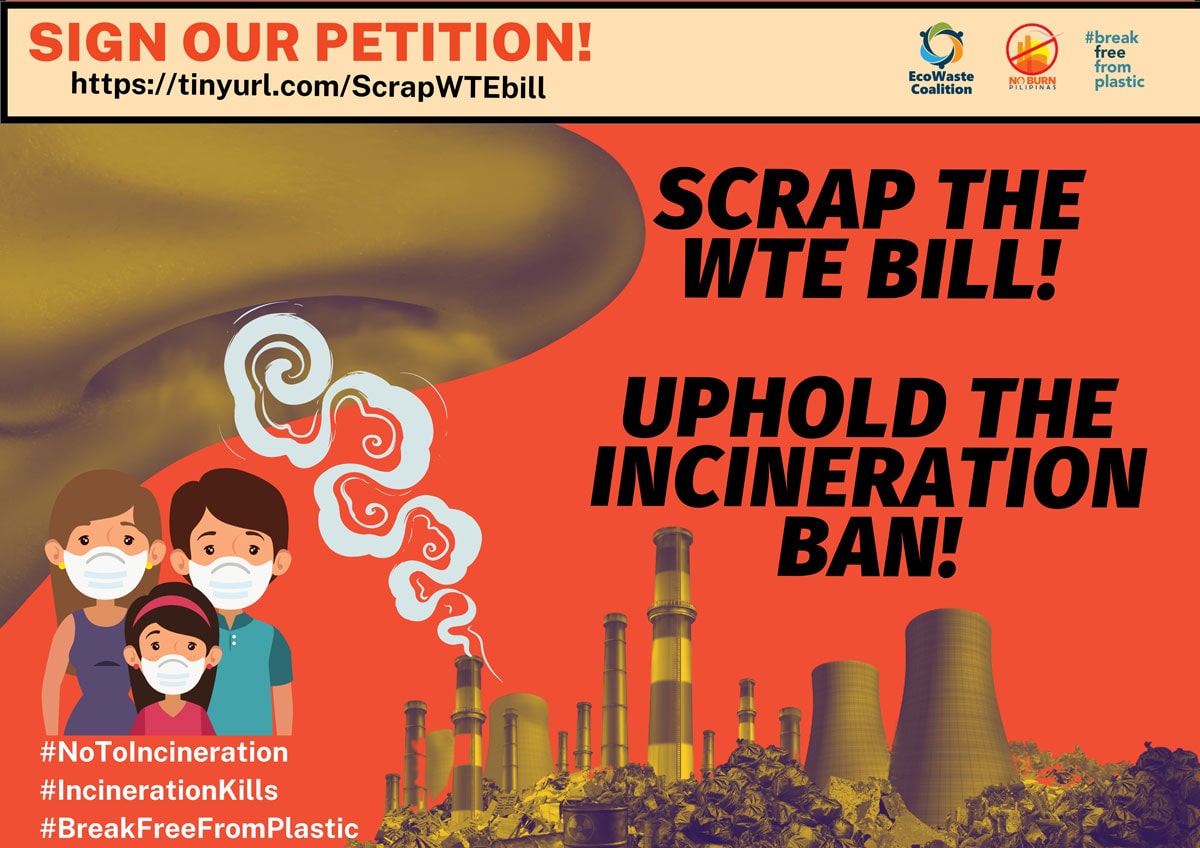Quezon City, Philippines— Environmental organizations, civil-society groups, faith-based institutions, academe, and community-based organizations are calling on the government for effective and sustainable environmental protection during the anniversary of the passage of the Clean Air Act into law on June 23. The Act prohibits the use of incinerators for waste disposal. The Philippines is the first nation in the world to ban incinerators outright.
In particular, the various groups are calling on the government to drop efforts to legalize garbage incineration through the Waste-to-Energy Act authored by Senator Sherwin Gatchalian. The groups are calling on the government to instead pass long-term, comprehensive waste management policies and safer practices that would reduce waste.
“Senator Win Gatchalian’s Waste-to-Energy Bill would defeat the purpose of the Clean Air Act and must be junked immediately by the 18th Congress. This proposed bill will only favor big waste management companies who will profit at the expense of taxpayers, local communities, and the environment. We demand that our government officials and lawmakers perform their sworn duties to enforce environmental laws and hold polluters accountable, ” stressed Aileen Lucero of the EcoWaste Coalition.
“What we need is a strong political will among our leaders and the government’s sincerity in addressing environmental issues such as excessive waste production and disposal. With the current pandemic, there must be a united plan in mitigating these problems by disallowing the funding of dirty energy projects like waste-to-energy incinerators which endanger the health of citizens due to the release of harmful greenhouse gas, and poisonous chemicals such as dioxins and furans,” she further said.
In a letter sent to the Senate last month and signed by the groups, they reiterated the need for stricter implementation of environmental laws and the potential harm WTE technologies and facilities pose to human health, communities, and the environment.
“The government should pursue solutions that genuinely protect and preserve the constitutional rights to health and a balanced and healthful ecology. One key problem with Waste-to-Energy technologies is that they legitimize continued extraction from the environment; while also contributing to climate change, polluting the environment and threatening human health. WtE technologies promote a false narrative that harms efforts to pursue real sustainable solutions aimed at reducing waste production and achieving a circular economy,” said Lievj Alimangohan of No Burn Pilipinas.
“Although several laws were passed together with the Philippine Clean Air Act of 1999 to protect our communities and the environment, such as the Ecological Solid Waste Management Act of 2000; Toxic Substances and Hazardous and Nuclear Wastes Control Act of 1990; the Philippine Mining Act of 1995; the Philippine Fisheries Code of 1998; and the Philippine Clean Water Act of 2004, among others, but still these laws are the most notoriously violated and unfunded in our country,” added Rei Panaligan of Plastic-Free Pilipinas Project.
They also said there are viable and eco-friendly solutions to address our waste problem without resorting to polluting disposal methods like burning and incineration.
“WTE facilities do not provide a safe, technologically advanced means of waste disposal but with the Zero Waste approach, barangays have managed to reduce and eliminate waste off our streets and even saved millions of pesos while creating jobs,” said Archie Abellar of GAIA Asia Pacific.
“Municipalities and barangays in the country are already practicing zero-waste which is a circular system that minimizes unnecessary extraction and consumption, reduces waste, and ensures that products and materials are reused or recycled back into nature or into the market,” he added.
# # #
For more information, please contact:
Geri Matthew Carretero
Communications Officer
09176216901
Plastic-Free Pilipinas Project
The Plastic-Free Pilipinas project is a collaboration of #breakfreefromplastic members EcoWaste Coalition, GAIA Asia Pacific, Greenpeace Southeast Asia, Health Care Without Harm Southeast Asia and Mother Earth Foundation. The #breakfreefromplastic is a global movement working towards a future free from plastic pollution.




